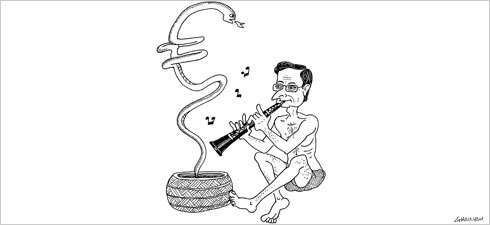“Draghi gives his assurances that the ECB will save the euro,” announces the Corriere della Sera, stating that the Milan Stock Exchange gained 5.62 percent after the statements from the president of the European Central Bank. And on July 27 Rome was able to borrow 8.5 billion euros for six months at a rate below six percent. For the daily, this reveals a “banal truth” —

It is not true that governments without money and central banks with rates close to zero cannot stimulate the economy. They can and they have done so, in a simple but sophisticated way: by making commitments for the future.
This is what the Federal Reserve chairman Ben Bernanke did when he pledged to keep borrowing rates at zero percent at least until late 2014, reports the Corriere della Sera. Draghi, like Bernanke, is thus helping the economy by resorting to psychology —

With his words, Draghi has neither printed money nor created liquidity, but has reassured the markets and is offering something that is much rarer these days: confidence.
In Madrid, El País is pleased that “the financial storm over Spain has been calmed with a single gesture from the ECB”. The “magic words” of Mario Draghi had an immediate effect, as the Madrid Stock Exchange soared by six percent and the interest rate on government ten-year bonds dropped below seven percent. But, the newspaper asks,

Why did the ECB not react earlier? An assumption widely shared is that the ECB has been punishing the government [Spanish] for its mismanagement of the financial crisis. And as the punishment has now touched Italy, the monetary authority has shifted its policy towards the target the governments are demanding: to calm speculation on sovereign debt. Another possible explanation is that Draghi has spoken out now that a Spanish bank bailout is already irreversible and the stability mechanism has been prepared [...] Draghi’s bold sally is only a first step, which must be interpreted as firm evidence that the European Commission has already decided on the form and scope of the action of the new Stability Mechanism [...] – the hypothesis that the ECB is ready to intervene has shut down speculation against the euro and temporarily staved off the risk of the euro collapsing. But it does not guarantee that Spain has averted the risk of an intervention [a global bailout].
El Mundo also notes that “the magic words of Draghi provoked euphoria in the markets”. For the daily —

Never, until yesterday, had the ECB president done honour to his nickname: Super Mario. The fact that a mere declaration of intent can generate this reaction [in the markets] shows the power of the ECB. [.. .] We’ll have to see how far the ECB can go to support our economy, but his statement suggests that Draghi has the support of Merkel to keep Spain and Italy from succumbing to the pressure from the markets.
German reactions have been less enthusiastic. Die Welt writes deploringly that “the ECB appears to be a Trojan horse.” The conservative daily thinks that Mario Draghi is transforming “the symbol of a new Europe, a Europe of reforms, of principles, of a stable currency” into an institution for organising a “vast redistribution at the expense of Northern Europe”, which runs contrary to the democratic process —

[The positive market reaction] is just a flash in the pan. International investors have turned their backs on the eurozone, and in London there is surprise at how many wealthy Greeks are buying expensive houses. This is the end of confidence; capital is leaving Europe. And the ECB stands willing to plug the holes in the balance sheets of banks and states. This it justifies by saying that it’s the only institution still functioning in Europe that’s capable of stopping this crisis of confidence. But the so-called guardian of the currency is just making things worse this way.
For its part the Süddeutsche Zeitung notes that, at bottom —

This is about whether the ECB has the right to buy Spanish bonds to lower the country’s interest rates. Draghi and his colleagues have already invested 210 billion euros in the bonds of risky states, to little result. Politically, the appeal to the ECB is understandable. In theory the guardians of the currency have unlimited financial resources. In this tense situation, that makes them both stronger and weaker at the same time. Stronger, because the central bank could swiftly stamp out the fires in the financial markets. Weaker, because that would solve none of the problems. Quite to the contrary: in those states in crisis, once the fire has been put out, the will to get on with reforms will also be quenched.
The Guardian, meanwhile, notes that the commitment of Mario Draghi to do everything to save the euro, as courageous as it is, is short on detail —

Unfortunately, as in poker, merely declaring that you hold strong cards doesn’t always intimidate the table. [...] Was he claiming the right to start buying bonds if the market doesn’t behave itself by lending to Spain and Italy at a cheaper rate? [...] But there’s a reason why the ECB’s bond-buying activities... have been frozen for months – it’s because anything that smells like back-door financing of sovereign states tends to get squashed by Germany, among others. [...] In the absence of clarity, there are possible bearish interpretations of his words. For example: are eurozone policymakers simply trying to quieten markets over the summer to give themselves time to prepare a full bailout of Spain?
Was this article useful? If so we are delighted!
It is freely available because we believe that the right to free and independent information is essential for democracy. But this right is not guaranteed forever, and independence comes at a cost. We need your support in order to continue publishing independent, multilingual news for all Europeans.
Discover our subscription offers and their exclusive benefits and become a member of our community now!












